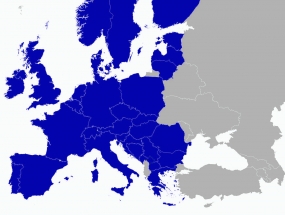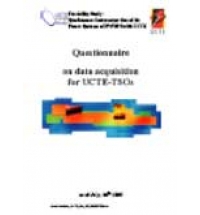Feasibility Study: Synchronous Interconnection of the Power Systems of IPS/UPS with UCTE
client: E.ON Netz GmbH (Germany), UCTE, EPC CIS, IPS/UPS
type: Regional Study (Transmission, Policies)
finishing date: 2008
team: The UCTE-Consortium responsible for the project consists of 11 TSOs from 9 countries, on IPS/UPS-side a group of 7 companies have established a joint agreement for the project; EKC team: M. Vukovic, S. Mijailovic, P. Miksa, Dj. Dobrijevic, Z. Vujasinovic, V. Nesic, B. Radovic
With the active support of the European Commission, the largest system study in the history of UCTE was kicked-off on 20 April 2005 in Brussels after several years of preparation. In the beginning of 2002 the Electric Power Council of Commonwealth of Independent States (EPC CIS) expressed its interest in a synchronous interconnection of the power systems of the CIS countries and the Baltic States (IPS/UPS) with the power systems of the members of the Union for the Co-ordination of Transmission of Electricity (UCTE).
The main objectives of the study are to investigate the technical, operational, organizational and legal feasibility of an East-West synchronous interconnection of the transmission systems and to identify necessary measures and associated costs for implementation for all systems. The project work is comprised of a combination of analysis and power system simulation of two synchronously coupled systems without enforcing regulations and standards from one system to the other. The initial priority for the investigations is to maintain the current level of system security and reliability in the systems concerned, a major challenge to be met jointly by experts from IPS/UPS and UCTE.
The main objectives of the study can be classified in more detail as follows:
Power system analysis and technical aspects:
- determination of the maximum power that can be transmitted over the interface in both directions according to technical considerations and simulations of a large number of probabilistic network situations,
- identification of main bottlenecks in the grid and technical constraints,
- analysis of the dynamic behavior of the interconnected system:
- assessment of the risk of inter-area oscillations and if necessary definition of damping measures,
- analysis of transient stability in case of selected severe short circuits,
- analysis of the behavior of the power/frequency control,
- analysis of the effect of the emergency control systems of IPS/UPS on UCTE,
- identification of disturbed system conditions, which may lead to a disconnection,
- definition of criteria for a disconnection of IPS/UPS and UCTE,
- investigation of the impact of a disconnection on both systems and to make recommendations concerning defense and restoration plans,
- allocation of investments and comparison with other technical options.
Operational and organizational aspects:
- proposal of detailed operation procedures related to the operation of the interface between both systems and set bilateral obligations,
- proposal of co-ordination strategies and procedures among the TSOs concerned,
- drawing-up of a time schedule for all necessary actions to be undertaken towards a synchronous connection including on site verification of their effectiveness,
- preparation of technical specifications and the time schedule for a test period for a possible interconnection,
- estimation of the associated cost for each action.
Type of services provided:
- Data collection and analyses
- Load flow analyses
- Voltage profile and stability analyses
- Dynamic stability analyses
- Defense plans analyses
- Power system control
- Organizational and operational analyses


